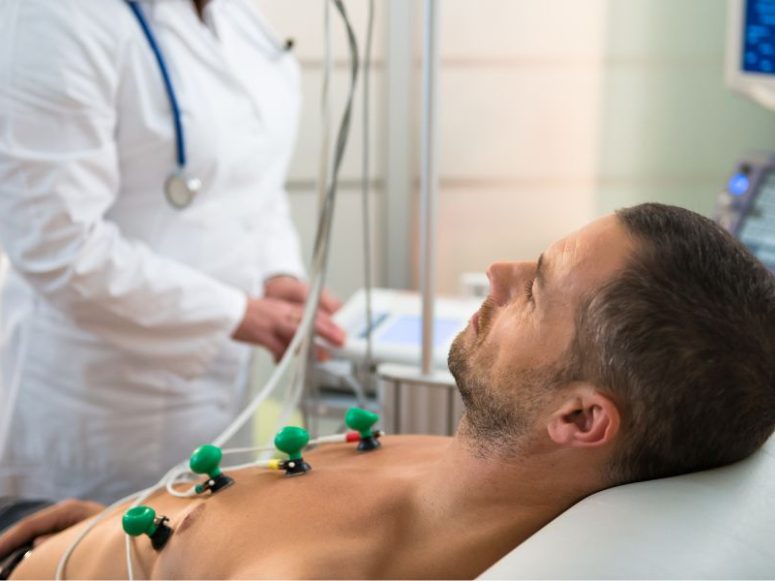Key Points
- Early detection capabilities make EKGs invaluable - they can identify heart rhythm abnormalities, previous heart attacks, and cardiac conditions up to 5-10 years before symptoms appear, potentially preventing sudden cardiac death.
- Non-invasive and immediate results provide instant cardiac assessment in just 5-10 minutes, making EKGs one of the most efficient diagnostic tools for evaluating chest pain, shortness of breath, and heart palpitations.
- Cost-effective screening at $50-150 per test can prevent thousands in emergency treatment costs by detecting conditions like atrial fibrillation, which affects 6 million Americans and increases stroke risk by 500%.
Electrocardiogram (EKG) testing represents one of the most valuable and accessible tools for monitoring heart health and detecting cardiac conditions. Understanding the benefits of EKG testing helps patients make informed decisions about their cardiovascular health and potentially life-saving medical care.
EKG testing provides immediate insights into your heart's electrical activity, revealing information about heart rhythm, rate, and overall cardiac function. This simple, painless test can detect serious heart conditions before they become life-threatening emergencies.
Understanding EKG Technology and Capabilities
How EKG Testing Works
An EKG measures the electrical impulses that control your heartbeat, creating a visual representation of your heart's rhythm and electrical activity. This non-invasive test uses electrodes placed on your chest, arms, and legs to detect and record electrical signals from your heart.
The test takes only 5-10 minutes to complete and provides immediate results that healthcare providers can interpret to assess your cardiac health and identify potential problems.
Types of Heart Conditions EKGs Detect
EKGs can identify numerous cardiac conditions including irregular heart rhythms (arrhythmias), previous heart attacks, enlarged heart chambers, electrolyte imbalances, and medication effects on the heart.
The test can also detect signs of coronary artery disease, heart valve problems, and inherited cardiac conditions that may not cause obvious symptoms but pose serious health risks.
Early Detection and Prevention Benefits
Identifying Silent Heart Conditions
Many serious heart conditions develop without obvious symptoms, making EKG testing crucial for early detection. Conditions like atrial fibrillation, previous silent heart attacks, and dangerous arrhythmias can be identified through routine EKG screening.
Early detection allows for prompt treatment that can prevent complications such as stroke, heart failure, and sudden cardiac death. This preventive approach can add years to your life while maintaining quality of life.
Risk Stratification
EKG testing helps healthcare providers assess your risk for future cardiac events, allowing for personalized prevention strategies. This risk assessment guides decisions about medications, lifestyle modifications, and additional testing.
Understanding your cardiac risk enables proactive management that can prevent heart attacks, strokes, and other serious cardiovascular complications.
Monitoring Treatment Effectiveness
For patients with known heart conditions, regular EKG testing monitors treatment effectiveness and disease progression. This monitoring ensures that medications and interventions are working properly and allows for adjustments when needed.
Diagnostic Benefits for Acute Conditions
Chest Pain Evaluation
EKG testing is essential for evaluating chest pain and determining whether symptoms indicate a heart attack or other serious cardiac condition. Immediate EKG results guide treatment decisions and help determine appropriate care levels.
The test can distinguish between heart-related chest pain and other causes, preventing unnecessary emergency room visits while ensuring serious conditions receive prompt treatment.
Emergency Cardiac Assessment
In emergency situations, EKG testing provides rapid cardiac assessment that can be life-saving. The test quickly identifies heart attacks, dangerous arrhythmias, and other conditions requiring immediate intervention.
Emergency EKG results guide critical treatment decisions including medication administration, cardiac catheterization, and other life-saving interventions.
Symptom Investigation
EKG testing helps investigate symptoms such as palpitations, dizziness, shortness of breath, and fatigue that may indicate underlying heart conditions. The test provides objective data about heart function during symptomatic episodes.
Preventive Health Benefits
Routine Health Screening
EKG testing serves as valuable routine screening for adults, particularly those over 40 or with risk factors for heart disease. Regular screening can detect developing conditions before they cause symptoms or complications.
Preventive EKG screening is particularly important for people with family history of heart disease, diabetes, high blood pressure, or other cardiovascular risk factors.
Pre-Operative Assessment
Before surgery, EKG testing assesses cardiac risk and helps ensure safe anesthesia administration. This pre-operative screening identifies heart conditions that might complicate surgery or anesthesia.
The test helps surgical teams prepare for potential cardiac complications and modify anesthetic plans to ensure patient safety during procedures.
Sports and Employment Physicals
EKG testing is often required for sports participation, particularly in competitive athletics, to identify conditions that might cause sudden cardiac death during physical activity.
Many employers require EKG testing for positions involving physical demands or safety responsibilities, ensuring workers can safely perform their duties without cardiac risk.
Cost-Effectiveness and Accessibility
Affordable Diagnostic Tool
EKG testing is one of the most cost-effective diagnostic tools available, typically costing $50-150 per test. This affordability makes cardiac screening accessible to most patients, regardless of insurance status.
The low cost of EKG testing makes it practical for routine screening and monitoring, providing excellent value for the diagnostic information obtained.
Insurance Coverage
Most insurance plans cover EKG testing when medically indicated, including routine screening for patients with risk factors. Medicare and Medicaid also provide coverage for appropriate EKG testing.
Preventive EKG testing may be covered under wellness benefits, making routine cardiac screening accessible without significant out-of-pocket costs.
Widespread Availability
EKG testing is available at most healthcare facilities including primary care offices, urgent care centers, hospitals, and specialized cardiac clinics. This widespread availability ensures convenient access to cardiac testing when needed.
Specific Populations Who Benefit from EKG Testing
Adults Over 40
Adults over 40 benefit from routine EKG screening as part of comprehensive health assessments. Age-related changes in the heart and increased risk of cardiovascular disease make regular monitoring valuable.
Patients with Risk Factors
People with diabetes, high blood pressure, high cholesterol, family history of heart disease, or smoking history should receive regular EKG testing to monitor cardiac health and detect developing conditions.
Athletes and Active Individuals
Athletes and highly active individuals benefit from EKG screening to identify conditions that might cause problems during intense physical activity. This screening can prevent sudden cardiac death in apparently healthy individuals.
Patients with Symptoms
Anyone experiencing chest pain, palpitations, shortness of breath, dizziness, or other potential cardiac symptoms should receive EKG testing to evaluate their heart function and identify potential problems.
Limitations and Considerations
Normal EKG Doesn't Rule Out All Heart Disease
While EKG testing is valuable, a normal EKG doesn't rule out all forms of heart disease. Some conditions may not be apparent on a resting EKG and may require additional testing such as stress tests or cardiac imaging.
Timing of Testing
Some heart rhythm abnormalities are intermittent and may not be present during a brief EKG recording. Patients with intermittent symptoms may need extended monitoring or event recorders to capture abnormal rhythms.
Integration with Comprehensive Cardiac Care
Part of Complete Assessment
EKG testing works best as part of comprehensive cardiac assessment that includes medical history, physical examination, and other appropriate testing. This integrated approach provides the most complete picture of cardiac health.
Follow-Up Testing
Abnormal EKG results often require follow-up testing or specialist consultation to determine the significance of findings and develop appropriate treatment plans.
Future Developments in EKG Technology
Advanced Interpretation
Artificial intelligence and advanced computer interpretation are improving EKG analysis accuracy and helping identify subtle abnormalities that might be missed by human interpretation alone.
Portable and Wearable EKG
New technologies including smartphone-based EKG devices and wearable monitors are making cardiac monitoring more convenient and accessible for routine health monitoring.
Conclusion
EKG testing provides numerous benefits for cardiac health monitoring, early disease detection, and preventive care. This simple, affordable, and widely available test can identify serious heart conditions before they become life-threatening, guide treatment decisions, and monitor cardiac health over time.
The benefits of EKG testing far outweigh the minimal costs and time investment, making it an essential component of comprehensive healthcare for adults. Whether used for routine screening, symptom evaluation, or ongoing monitoring, EKG testing plays a crucial role in maintaining cardiovascular health and preventing serious cardiac complications.
References:
[1] American Heart Association. "Electrocardiogram (ECG or EKG)." https://www.heart.org/en/health-topics/consumer-healthcare/what-is-cardiovascular-disease/electrocardiogram-ecg-or-ekg
[2] Mayo Clinic. "Electrocardiogram (ECG or EKG)." https://www.mayoclinic.org/tests-procedures/ekg/about/pac-20384983
[3] American College of Cardiology. "Clinical Guidelines for EKG Testing." https://www.acc.org/








